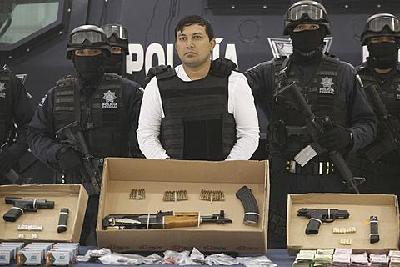The UN High Commissioner for Human Rights, Navi Pillay, is concluding a weeklong visit to Mexico, where she expressed concern over abuse of citizens by police and soldiers fighting organized crime groups. The major effort against drug cartels and other criminal organizations that began shortly after Mexican President Felipe Calderon took office in December, 2006, has now claimed around 40,000 lives. Experts say ending official corruption and impunity is the biggest challenge the government faces in trying to win the war.

On her visit to Mexico, UN High Commissioner for Human Rights Navi Pillay looked into problems including abuse of migrants and women. In a meeting with President Calderon, Pillay mentioned allegations against police and military forces in the war on drug traffickers.
"I view with concern the increasing reports of human rights violations attributed to state agents in the fight against organized crime." Pillay said.
She said authorities should not view respect for human rights as an obstacle, but as part of the solution in combating crime.
President Calderon responded that the worst abusers of human rights in Mexico are the criminal gangs that have tortured, mutilated and killed thousands of people. The drug cartels are fighting the government and each other as they compete for lucrative smuggling routes and drug profits.
At the inauguration of a new criminal investigation laboratory, supported in part by funds from the United States, President Calderon spoke of the need for reform and modernization of police forces.
He said human rights are protected when police use evidence to prove their case rather than confessions that might be made under duress.
Human rights groups complain that, in far too many cases, police without proper investigative skills detain suspects and torture them until they confess.
But President Calderon also condemned faults in the system that have allowed criminals to escape justice.
Calderon added that as long as criminals get away with crimes and go unpunished they will continue their illegal operations. He said Mexico must break the vicious cycle of impunity that allows transnational criminal organizations to operate.
To circumvent corrupt police, Calderon has used military forces against the powerful drug cartels. But deploying soldiers while trying to protect human rights is problematic, according to Mexico expert George Grayson of the College of William and Mary.
"Mexico has never, never had an honest, reliable, professional police force and this goes back to colonial times." Grayson noted. "So Calderon had no choice, when he found areas of the country dominated by cartels, but to use the military and the military is trained to pursue, to capture, to kill and, in the process, there is often collateral damage of civilians."
There have been many complaints from human rights activists about military abuses, but many citizens in violence-wracked areas often see soldiers as their only defense against the well-armed criminal gangs.
Citizen attitudes about police in Mexico may be part of the problem. Surveys have shown that Mexicans have little respect for their police and that paying small bribes to avoid such inconveniences as a traffic ticket is still common practice in much of the country. Mexican police are usually paid little and given only minimal training.
For the government to tackle such problems it will need public support in both spiritual and material terms. George Grayson says Mexicans in the upper and middle classes, who have been absent from this effort, need to do more and pay more.
"The elite pay little in taxes, about 10 percent of gross domestic product." Grayson added. "To give you an idea, Brazil pays 33 percent of gross domestic product in terms of taxes. Without more taxes you cannot have job creation programs, you cannot engage in regional development, you cannot restructure the public school system, you cannot improve health delivery services and, as a result, 40 percent of Mexicans live in poverty."
Part of the reason wealthy Mexicans pay so little in taxes is the government's reliance on revenues from the state-owned oil sector, which cover about a third of the federal budget. But Mexico's oil reserves are in decline and President Calderon has had limited success in opening the sector to foreign investment. So that issue, like the drug war and the effort to curb human rights abuses, will await the person who succeeds Calderon after next year's presidential election.
Three US citizens are killed in Mexico
72 dead migrants found in Mexico tip of iceberg
72 bodies found on Mexico ranch
Mexico braces for a violent 2010
(來源:VOA 編輯:崔旭燕)
